
New laws have been implemented in the southern Spanish province of Andalusia, allowing restaurant bosses to charge higher prices to customers sitting in the shade.
The Regional Government of Andalusia has granted this change, but restaurants must follow specific guidelines if they would like to increase prices. According to Facua spokesman Ruben Sanchez, the price changes for tables in shady or sunny spots should be visible to customers; this can be displayed on a menu at the restaurant site, but these must not be only available via a QR code because not everyone has access to a smartphone.
There needs to be more than just verbally letting customers know of the price changes under the new guidelines.
To prevent customers sitting at terrace tables from being charged excessively, there is a €10 limit on how much more restaurants can ask them to pay. Owners will not be allowed to charge more for tables with specific views at a restaurant in the province.
Failure of restaurants and bars to properly follow and adhere to these new regulations could result in them receiving a fine or facing punishment.
The new rules will primarily affect the tourists that flock to Andalusia, a popular spot due to the hot weather, architecture, and history. The Andalusian city of Cordoba recorded soaring temperatures of 47.6 degrees three years ago.
Other guidelines state that water should automatically be available to customers, and charging them for bottled water is illegal.
Also, restaurants cannot add service charges to any bills. Customers can do so with a voluntary tip if they want to show extra appreciation.
The new laws in Andalusia came when changes were considered to improve Spanish culture and society. Restaurants typically stay open till late hours, which can cause workers in the tourism and hospitality sector to work extra-long shifts.
Last month, Spain's Minister of Employment and Social Economy, Yolanda Diaz, said: "A country that has its restaurants open at one in the morning is not reasonable. It is crazy to try to continue extending hours until I don't know what time."
Diaz is keen for employees in the sector to have a limit on the number of hours they are obliged to work. He also is in favour of earlier closing times for restaurants.
Changes of this kind could threaten the experiences that tourists expect when travelling to Spain because they are used to dining at restaurants and bars during late evening hours.
The impact Diaz's proposed changes would have on Spain's renowned night culture has caused others to defend the nation's traditions and mention its positives.
President of the Community of Madrid, Isabal Diaz Ayuso, commented on X (formerly Twitter): "Spain has the best nightlife in the world, with streets full of life and freedom. And that also provides jobs."
In January, it was reported by the Madrid tourist board that there was a 17.5 per cent rise in the number of visitors to the Spanish capital compared to 12 months prior. Over €1 billion was spent by tourists whilst visiting the city, helping strengthen the economy.







